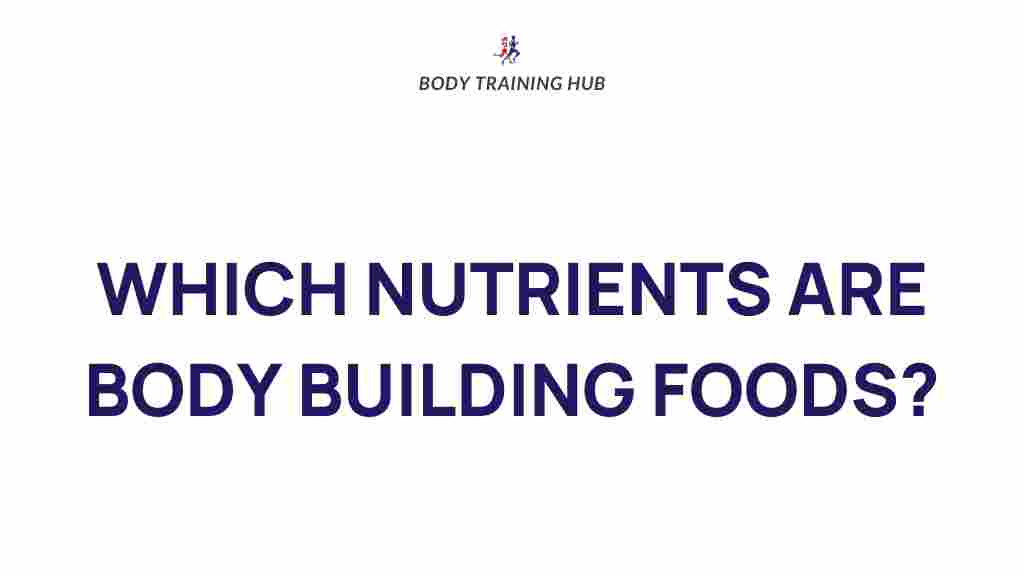Unveiling the Secrets of Body-Building Nutrition
Bodybuilding is not just about lifting weights; it’s a careful balance of exercise and nutrition. To achieve muscle growth and enhance your strength training, understanding how nutrition impacts your body is crucial. This article will delve into the essential nutrients, including protein, carbohydrates, and the role of supplements, to help you create a diet that supports your fitness goals.
The Importance of Nutrition in Bodybuilding
Nutrition plays a pivotal role in bodybuilding. Without the right diet, your body may struggle to recover from workouts and build the muscle mass you desire. Here’s why nutrition is essential:
- Muscle Repair: After strength training, your muscles need proper nutrients to repair and grow.
- Energy Levels: A well-balanced diet provides the energy needed for intense workouts.
- Overall Health: Proper nutrition supports immune function, bone health, and overall well-being.
Key Nutrients for Muscle Growth
To optimize your body building efforts, focus on the following key nutrients:
1. Protein
Protein is the cornerstone of any body building nutrition plan. It is essential for muscle repair and growth. The general recommendation for bodybuilders is to consume between 1.6 to 2.2 grams of protein per kilogram of body weight.
Sources of protein include:
- Chicken breast
- Turkey
- Fish (like salmon and tuna)
- Eggs
- Dairy products (milk, yogurt, cheese)
- Legumes (beans, lentils)
- Protein supplements (whey, casein, or plant-based proteins)
2. Carbohydrates
Carbohydrates are your body’s primary source of energy, especially during high-intensity workouts. They help fuel your workouts and replenish glycogen stores post-exercise. Bodybuilders should aim for complex carbohydrates, which provide sustained energy.
Good sources of carbohydrates include:
- Whole grains (brown rice, quinoa, oats)
- Fruits (bananas, berries, apples)
- Vegetables (sweet potatoes, leafy greens)
- Pasta and bread (preferably whole grain)
3. Fats
Healthy fats are essential for hormone production, including testosterone, which plays a significant role in muscle building. Aim to include sources of healthy fats in your diet, such as:
- Avocados
- Nuts and seeds
- Olive oil and coconut oil
- Fatty fish (like salmon)
Creating a Bodybuilding Diet Plan
Now that you understand the key nutrients, let’s discuss how to create an effective bodybuilding diet plan:
Step 1: Calculate Your Caloric Needs
To gain muscle, you need to consume more calories than you burn. Use a calorie calculator to determine your Total Daily Energy Expenditure (TDEE) and add 250-500 calories for muscle gain.
Step 2: Determine Macronutrient Ratios
Once you know your caloric needs, establish your macronutrient ratios. A common starting point for bodybuilders is:
- Protein: 25-30%
- Carbohydrates: 50-60%
- Fats: 15-25%
Step 3: Plan Your Meals
Distribute your macronutrients across 5-6 meals throughout the day. This can help maintain energy levels and support muscle growth. Here’s a sample meal plan:
- Breakfast: Oatmeal with protein powder and berries.
- Snack: Greek yogurt with nuts.
- Lunch: Grilled chicken with quinoa and steamed vegetables.
- Snack: Protein shake and a banana.
- Dinner: Salmon with sweet potatoes and asparagus.
- Evening Snack: Cottage cheese with flaxseeds.
Step 4: Stay Hydrated
Hydration is often overlooked but is crucial for optimal performance. Aim for at least 3-4 liters of water per day, especially during workouts.
The Role of Supplements in Bodybuilding Nutrition
While a well-balanced diet should provide most of the nutrients you need, some supplements can aid muscle growth and recovery:
- Protein Powder: Convenient for meeting protein needs.
- Creatine: Enhances strength and performance in high-intensity training.
- BCAAs (Branched-Chain Amino Acids): Help reduce muscle soreness and improve recovery.
- Multivitamins: Ensure you’re meeting your micronutrient requirements.
Remember to consult with a healthcare professional before starting any new supplement regimen.
Troubleshooting Common Dietary Issues
Even with a solid diet plan, you may encounter some challenges. Here are some troubleshooting tips:
1. Not Gaining Muscle
If you’re not seeing the muscle growth you desire, consider the following:
- Are you consuming enough calories?
- Is your protein intake sufficient?
- Are you consistent with your strength training routine?
2. Digestive Issues
Some bodybuilders experience digestive discomfort. To alleviate this:
- Opt for easily digestible sources of protein.
- Incorporate fiber gradually to avoid bloating.
- Stay hydrated to aid digestion.
3. Lack of Energy
If you feel fatigued, reassess your carbohydrate intake:
- Are you consuming enough complex carbs?
- Are you timing your meals around workouts?
Conclusion
Mastering body building nutrition is essential for anyone looking to enhance their muscle growth and performance. By focusing on protein, carbohydrates, and healthy fats, along with a well-structured diet plan and the right supplements, you can optimize your strength training results. Remember, consistency is key, and always listen to your body’s needs. For more tips on fitness and nutrition, check out this resource.
Embrace the journey of bodybuilding, fuel your body wisely, and watch as you achieve the results you’ve been striving for!
This article is in the category Nutrition Fundamentals and created by BodyTraining Team
